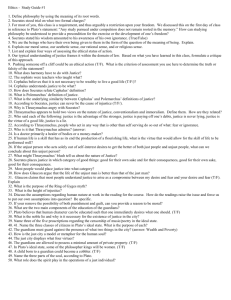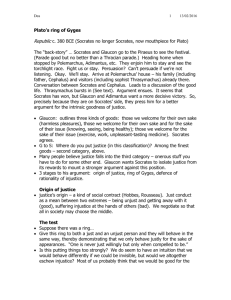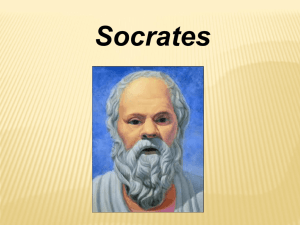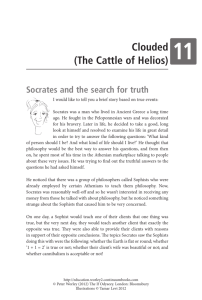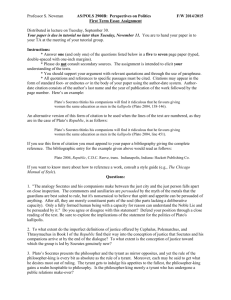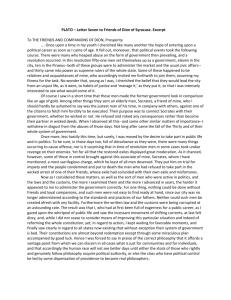Plato`s the republic Book 1 section 1 study
advertisement
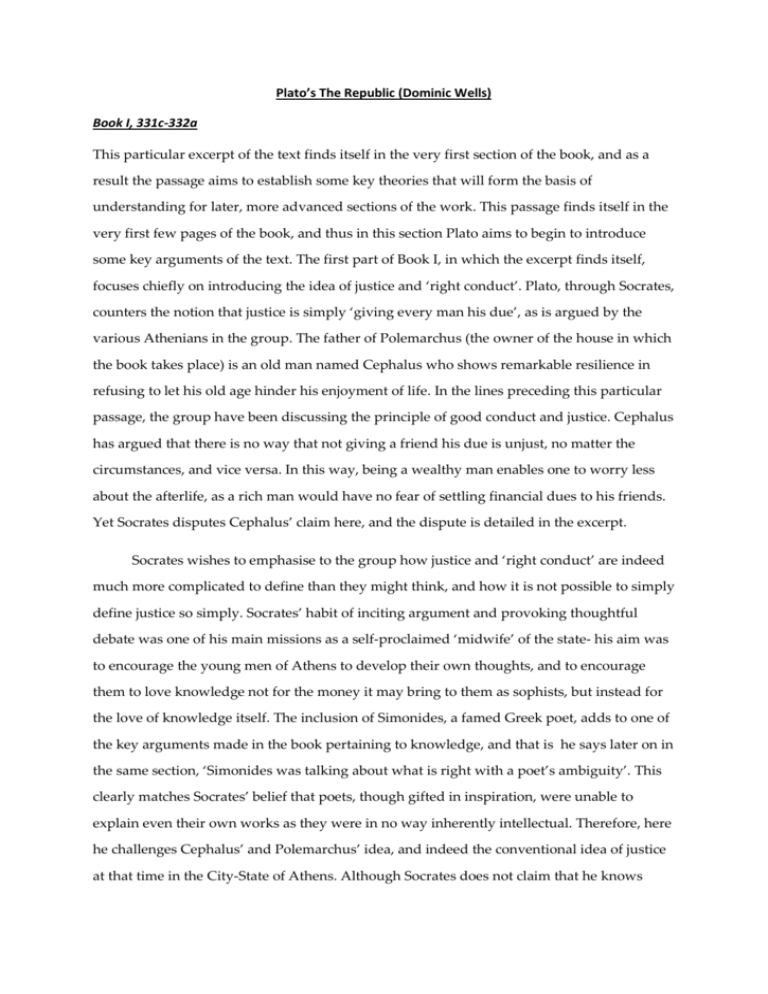
Plato’s The Republic (Dominic Wells) Book I, 331c-332a This particular excerpt of the text finds itself in the very first section of the book, and as a result the passage aims to establish some key theories that will form the basis of understanding for later, more advanced sections of the work. This passage finds itself in the very first few pages of the book, and thus in this section Plato aims to begin to introduce some key arguments of the text. The first part of Book I, in which the excerpt finds itself, focuses chiefly on introducing the idea of justice and ‘right conduct’. Plato, through Socrates, counters the notion that justice is simply ‘giving every man his due’, as is argued by the various Athenians in the group. The father of Polemarchus (the owner of the house in which the book takes place) is an old man named Cephalus who shows remarkable resilience in refusing to let his old age hinder his enjoyment of life. In the lines preceding this particular passage, the group have been discussing the principle of good conduct and justice. Cephalus has argued that there is no way that not giving a friend his due is unjust, no matter the circumstances, and vice versa. In this way, being a wealthy man enables one to worry less about the afterlife, as a rich man would have no fear of settling financial dues to his friends. Yet Socrates disputes Cephalus’ claim here, and the dispute is detailed in the excerpt. Socrates wishes to emphasise to the group how justice and ‘right conduct’ are indeed much more complicated to define than they might think, and how it is not possible to simply define justice so simply. Socrates’ habit of inciting argument and provoking thoughtful debate was one of his main missions as a self-proclaimed ‘midwife’ of the state- his aim was to encourage the young men of Athens to develop their own thoughts, and to encourage them to love knowledge not for the money it may bring to them as sophists, but instead for the love of knowledge itself. The inclusion of Simonides, a famed Greek poet, adds to one of the key arguments made in the book pertaining to knowledge, and that is he says later on in the same section, ‘Simonides was talking about what is right with a poet’s ambiguity’. This clearly matches Socrates’ belief that poets, though gifted in inspiration, were unable to explain even their own works as they were in no way inherently intellectual. Therefore, here he challenges Cephalus’ and Polemarchus’ idea, and indeed the conventional idea of justice at that time in the City-State of Athens. Although Socrates does not claim that he knows exactly what justice is, he aims to establish a working principle of it which he fits in to his ideal City or ‘Kallipolis’. In this passage therefore, Socrates points out that justice and ‘doing right’ is not solely concerned with truthfulness, and indeed sometimes the use of truth in justice can be harmful. He extends the argument that if one borrowed a weapon from a friend who then went mad and later asked for it back, it would be harmful to return it in case he used it against others. In this way, simply telling the truth is not always the just decision.Socrates continues to state how Simonides’ argument, although seemingly sound, is actually inviable. This could be seen as reflective of Socrates’ opinion of poets and indeed other ‘educated’ members of Athenian society, such as the sophists. Firstly, he believed fervently that although poets were capable of producing great works, and that they were born with an inherent skill/ inspiration in creating these poems, they were also incapable of comprehending them. This links in with his idea that all people, just as eyes and ears do, have a single function that they can perform well- they are unable to efficiently carry out any other job- so for example, an eye is only really efficient at carrying out the one function it was designed for- seeing. In this respect, the poet is only capable of creating world of art thanks to his natural aptitude. Yet he cannot fully comprehend the text. Only a philosopher could do that, since the natural aptitude of the philosopher is only to gain knowledge.

